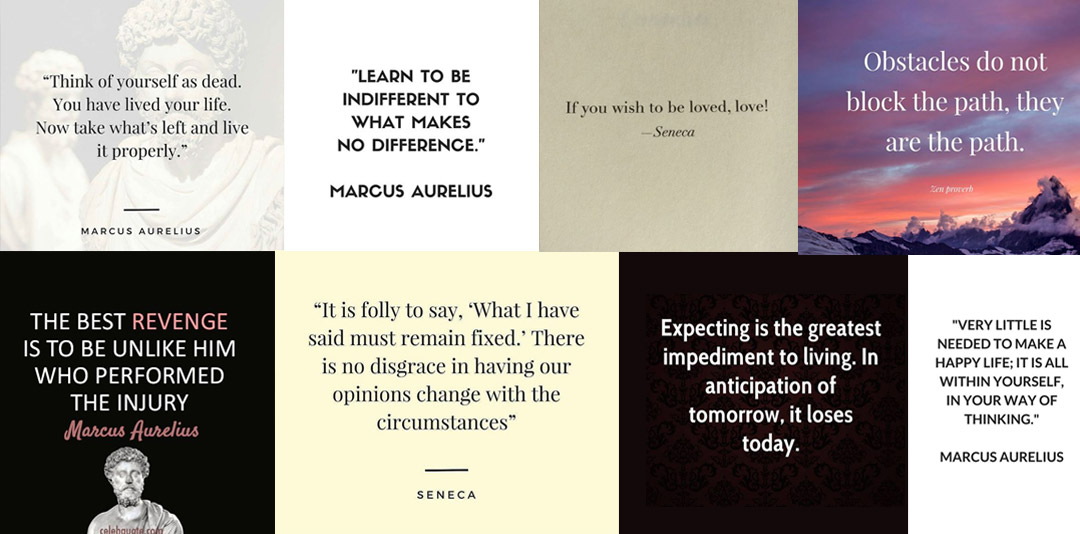The obstacle is the way
Athletes must be mentally strong. They mustn’t be rattled, they are resilient in the face of hardship and controlled enough to endure pain without complaint or question. Great athlete’s don’t panic or choke under pressure, they possess emotion but remain focused and cool-headed— they are well practiced in the art of Stoicism.
What is Stoicism you ask? Well, without having your eyes glaze over from a long history lesson, I’ll explain the gist of it—An ancient Greek philosophy similar to Buddhism that believes in taking obstacles in your life and turning them into your advantage, control what you can and accept what you can’t.
Stoicism, a mental game
One of the great Stoic philosophers, Epictetus once said; “there will be times when you will sprain a wrist, turn your ankle and swallow mouthfuls of sand. And after all that there are times when you lose“. And yet, for every obstacle there is a chance to improve our condition. Every setback is an advantage and an opportunity for learning.
Let’s face it, just when you think you’ve successfully navigated one of life’s obstacles, another emerges. But obstacles are what keep life interesting and what create opportunities. Life is a series of trail features we must break through, and each time we do, we emerge sharper, we learn something, we develop strength, wisdom and perspective.
“We suffer more in imagination than in reality.” – Marcus Aurelius
There is a temptation that exists for all of us to let our imagination run wild envisioning all the ways things can go wrong. This can be useful in preparing us for the future and adversity, but it can also become crippling fear that stops us from taking action.
When you’re faced with obstacles, stress and other threats, this is when your resiliency and stoic abilities, or lack thereof emerges: Do you succumb or do you surmount? Failure and setbacks put you in a corner you have to work your way out of, and this is where breakthroughs happen. When you can build a tolerance for failure and be spurred on instead of stopped, problems can become opportunities and lessons—and you have the chance to get ahead of those who were too impatient to be taught.
How you participate in sport is how you can participate in everything
Athletes don’t think solely about winning the competition or capturing the cup. They think about what they need to do in the moment, during the task at hand. They follow the process, not the end result. Players are not watching the clock, they’re giving it their all, moment to moment, knowing every second is available to use until the whistle comes. —They are “in the zone”.
As many great athletes can attest to, a present state of mind is incredibly valuable when trying to bring forth his or her best when it matters most. My good friend and professional waterskiier Whitney McClintock says:
“I ski my best when I am able to focus on the task at hand, which is not beating a particular score or winning. The task at hand is skiing, and doing it how I know best. Focusing on the process allows me to move in the direction of my dreams. When practicing, I zoom in on a couple movements or thoughts I want to master. In competition, focusing on those makes it possible for me to accomplish my goals. When I remain centred in my ability to “do my thing” on the water, I know I’m in the right frame of mind to be a champion.”

Whether you’re participating in sport or life, if you’re not present in the moment your energy is diluted and not as powerful as it could be. Stoicism is about seeing what is up to you in any given situation, focusing on doing that well, and on doing the act with kindness towards others.
Epictetus suggested that the mistake many people make is to focus their attention and energy on things that are not in their power to change. He believed that we should focus only on what is in our power to control. So stop thinking about the potential outcome of your deadline coming, what it would mean if you lost that race, or the consequences if your brilliant business idea flops—instead settle into the present moment and do what you can in that very moment. Chip away.
Train accordingly, pace yourself and conserve your energy. Understand that each obstacle is one of many and you can take a small lesson away from each and use it to your advantage for the next one, we get better with every attempt. Life is merely a series of moments, keep steady and roll with them as they come.
Practice, practice, practice the art of Stoicism
Relentless tenacity is an essential aspect of Stoicism. Some of the most successful athletes were not necessarily the most gifted athletically, but they were relentless in their process and effort. They had no control over their genetics, but they had control over their effort and attitude on the road to success.
Like the tendency to avoid mistakes, we often avoid challenges…because we think challenge often leads to error or painful psychological strain. But avoiding challenges is trading long term fulfillment for short term safety. When you’re a Stoic you’ll begin to see failures and setbacks as stepping stones to success. When you’re a pessimist, you see failures as confirmation of your prediction of failure.
“Choose not to be harmed and you won’t feel harmed. Don’t feel harmed and you haven’t been.” -Marcus Aurelius
Stoic Principles
1. Always improve
See each situation not as a failure, but as a way to improve.
2. Persevere when frustrated
Adversity can harden you. Or it can loosen you up and make you better — if you let it. Choose to rename it and own it. “The impediment to action advances action. What stands in the way becomes the way.” – Marcus Aurelius
3. Embrace Challenges
A problem presents an opportunity for a solution. It is in these moments we can seize the offensive and when people least expect, we can pull off our biggest victories.
4. Amor Fati: Love Everything That Happens
Although unnatural to feel gratitude for things we never wished to happen, consider how many times you’ve begrudgingly acknowledged later that something was for the best—so make an effort to have gratitude in advance. There is good in everything, if we look for it.
Enjoy the process: anything can happen on race day
Let’s face it, rarely do things turn out how you imagine. So why do we waste so much energy telling life how it should be, when we could just take life as it comes. No good can come from blaming outside forces or other people, writing yourself off as a failure or believing your aspirations are impossible. There is only one thing we really control: our attitude and approach.

Further Reading
If you find stoicism to be interesting, there are several books well worth reading on the subject.
- The Obstacle Is the Way by Ryan Holiday. The Obstacle Is The Way reveals the Stoicism formula and shows us how we can turn our own adversity into advantage.
- Meditations of Marcus Aurelius A series of personal writings by Marcus Aurelius, Roman Emperor from 161 to 180 AD, recording his private notes to himself and ideas on Stoic philosophy. Free Download Meditations of Marcus Aurelius PDF
- Letters from a Stoic a selection of Seneca’s letters with advice on grief, on wealth, on power and showing his ethical ideals of Stoicism.
Photo Credits: Red Bull / Brandon Semenuk
Whitney McClintock whitneymcclintock.com





No Comments